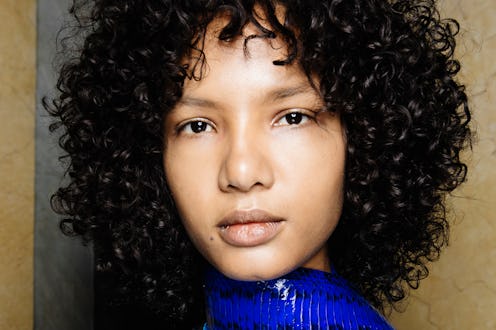(Beauty)
All About Awapuhi, The Secret Ingredient For Longer & Stronger Hair Growth

I can always tell when I'm about to come down with a cold, or something even more severe. It's marked by a subtle, yet bothersome itch in the back of my throat that always seems to be the ominous warning of a week from hell to come. I haul it to the nearest Whole Foods, buying out ginger shots and knocking them back aggressively in hopes of hindering any illness that's forming. Luckily, almost every time, it works. And while the benefits of the herbaceous plant for curing respiratory ailments is tried and true, ginger for hair may be the latest antidote for growth, fullness, and a healthy scalp.
There may be no scientific backing of its contributions to beauty — yet — but dermatologists, botanists, and brands alike can all agree that ginger is having its moment. "While there's no documented evidence, there have been reports that ginger may help stimulate hair growth," Dr. Hadley King, M.D., a New York City board-certified dermatologist, tells TZR. "Ginger has anti-inflammatory and antioxidant properties, allowing it to decrease inflammation and help prevent damage from free radicals. The anti-inflammatory properties could make ginger helpful for soothing inflammatory scalp conditions such as seborrheic dermatitis, or dandruff." And Hadley insists that a healthy and thriving scalp is one of the key components to flourishing and robust heads of hair. "Theoretically, when inflammatory scalp conditions improve, hair growth may improve," Hadley says.
For at-home remedies, King suggests a hydrating hair mask with only two ingredients, one of course being ginger. "Mix equal parts grated ginger and jojoba oil," she says. "Massage it into the scalp and hair. Leave on for 30 minutes and then rinse and shampoo. You'll give your scalp an added dose of moisture."
But it's the ginger root's offspring that might actually be even more potent. Awapuhi (pronounced ah-wah-poo-hee), is the tropical plant whose benefits date back centuries. "It's important to know that the ginger plant that Awapuhi comes from and the ginger root plant that we commonly use in medicinal preparations, essential oils, and food, are in fact related, botanically," Amy Galper, co-founder of New York Institute of Aromatic Studies and co-author of Plant-Powered Beauty: The Essential Guide to Using Natural Ingredients for Health, Wellness, and Personal Skincare, says. "But the therapeutic properties that are universally recognized for the ginger plant that we use in our cooking and essential oils, exists only in the root, not the flower. It's also from a different kind of ginger, a different species."
Even though the properties are related, they don't serve the same purpose for hair and skin. "Making the differentiation is important," Galper says. "The ginger root that we use in cooking oils and Chinese medicine has very different therapeutic effects on the body compared to the gooey substance squeezed from the ginger flower."
But just like ginger root, Awapuhi's calming benefits make it a sought-after ingredient for many beauty products, particularly for hair. "Awapuhi is the oozy juice that is squeezed from the flower," Galper explains. "It has lots of great benefits, mostly for its anti-inflammatory and tissue-reparative properties."
If you're not living in a tropical paradise surrounded by Awapuhi flowers, then there are plenty of shampoos, conditioners, and styling products that feature the ingredient. If you do live in a tropical paradise, then I'm eagerly waiting for your invite.
This article was originally published on